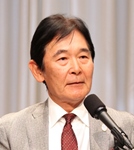The State of Music and Copyright in the World
January 21, 2015
Mr. Shunichi Tokura
Chairman, Japanese Society for Rights of Authors,
Composers and Publishers
�� Today, I will speak on how difficult the management of music copyrights has become, due to dramatic changes in the music industry and its system throughout the world, as well as some challenging issues the Japanese Society for Rights of Authors, Composers and Publishers (JASRAC) faces.
Today, I will speak on how difficult the management of music copyrights has become, due to dramatic changes in the music industry and its system throughout the world, as well as some challenging issues the Japanese Society for Rights of Authors, Composers and Publishers (JASRAC) faces.
��A general overview on the history of music tells us that Europe played a central role from the 19th century to modern times where all kinds of music developed. The 20th century became an era of the US where music developed through the fusion of musical talents of different races. Music was once a pleasure for aristocrats, ordinary people and artists, but it expanded into a major industry, supported by the development of phonographs and radios.
��The 21st century is said to be the era of Asia in all areas, including music. The Asian mega market encompasses ASEAN countries, China and India where half of the world��s population reside. I must say, however, this region lags behind in the protection of intellectual property rights, making Japan an exception with its well-organized copyright management system.
��Japan ranked at the top, followed by the US, in terms of copyright royalties collected in 2012 among the five major countries (US, UK, Germany, France and Japan). But the figures for the US includes only the performance rights fees collected by two organizations ASCAP (American Society of Composers, Authors and Publishers) and BMI (Broadcast Music, Inc.) and it does not include the recording rights fees. Therefore, the US would definitely be first if we combine these two fees.
��The greatest source of concern for JASRAC is the copyright management system in China. The Music Copyright Society of China (MCSC) is affiliated to the International Confederation of Societies of Authors and Composers (CISAC) and is in charge of collecting copyright royalties. Members of CISAC are bound by mutual management contracts and the royalty payments from Japan to China totaled 26 million yen in 2013. In the same year, China remitted 7 million yen of copyright royalties to Japan. When China pushed its reform and open-door policies in the 1990s, the majority of Japanese music companies expanded their business to China with great expectation. Unfortunately, there remain only a few companies today due to insufficient copyright management systems in the country, which has led to a decline in investments.
��Another challenging issue for JASRAC is the illegal sound and image recordings prevalent throughout the world. Advancement in digital technology plays an instrumental role in producing pirated copies, which take away 28% of music sales profit worldwide. When I visited Taiwan in the 1970s, I found a street vendor selling cassette tapes of Japanese hit songs, including the piece I had composed. When I listened to the tape, I was surprised by its poor sound quality that made it almost inaudible. Today, thanks to the digital technology, we can copy and even distribute the original music over tens of thousands of times without any loss of its sound quality.
��The number of music pieces composed has kept growing in Japan and 10.39 million pieces were eligible for copyright remuneration payments in 2012. JASRAC calculated how many times these 10.39 million pieces of music were played on radio, TV, movies and even sung at koraoke bars in one year, and it was a staggering 1.64 billion times. Teenagers of today use their mobile phones to buy their favorite music via the internet. 80% of them have never bought a CD in their lifetime. I fear that record companies could go out of business in five years. Now, the advent of the ��cloud�� era has brought an even greater change in the way we enjoy music. The new ��music streaming service�� allows users to listen to music anytime they like without saving the data on their mobile phone or iPod. The world��s largest streaming service Spotify is scheduled to start operating in Japan this April. All of these changes make the music copyright management even more complicated and difficult.
��JASRAC also deals with the extension of copyright duration for all forms of creative work, including music, art, novels and movies. Western developed countries have set the duration of 70 years after the copyright holder��s death, while Canada and Japan have the duration of 50 years. As music distribution transcends national boundaries today, the gap in such years leads to unfairness. This is why JASRAC has been negotiating to extend it by 20 years to meet the world standard. Another issue related to copyright duration is ending the 10-year extension for Japan to continue paying royalties to rights holders in 15 World War II victor nations as a penalty, on the basis that Japan had failed to protect victor countries�� copyrighted materials from the start of the war in the Pacific in 1941 over 10 years. We find this obligation unfair because Germany and Italy, the two countries with which Japan fought against the Allied powers, are exempted from it. We believe the war will not be over until this issue is resolved. These issues are currently negotiated in the framework of the Trans-Pacific Strategic Economic Partnership (TPP). We sincerely hope the Japanese government will work hard towards the successful conclusion of the TPP.